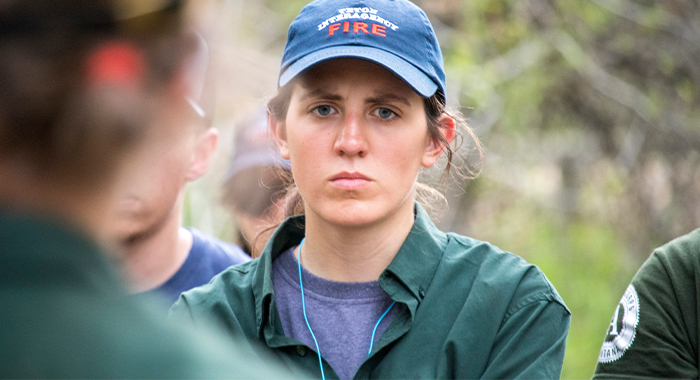Alumni Profile: Free-Agent Firefighter
The life of a firefighter in environmental protection sounds a little like touring in theatre. You get the call, follow the demands of your roll (not role) to the other side of the country, live with a tightly knit crew, work 16-hour days, go home for a few days’ break and potentially do it all again somewhere else. Applause not guaranteed but certainly earned; the people, creatures and land protected from fire would thank you if they knew. That last bit doesn’t happen in theatre.
Emily Owens ’17 spent part of the summer containing wildland fires in Southern California, her first assignment as a member of one of two Montana Conservation Corps all-female firefighter crews deployed to the area by the National Park Service from their base in Bozeman, Montana.
“We were mostly rookies, so we weren’t sent to do direct attack. We were doing mop-up, going along the boundary of the fire and literally touching the dirt, looking for spots that were hot to prevent flare-ups in the future. I spent a lot of time with my hands in the dirt.
“We are a hand crew, because we use hand tools like shovels, or Pulaski axes, to break up roots in the ground and literally dig the dirt. It’s hard, physical work.
“The more advanced hand crews, who get sent to the hottest and most complex parts of the fire, are called hot shot crews. They do cool stuff and you learn a lot, but I’m not sure if it’s the path for me. All firefighters have a tough work-life balance but it’s especially tough for hot shot crews because they get sent out for longer, usually 21 days, before they get a break. For me, the hardest thing at the beginning was being out of touch with friends and family.”
Owens decided her likely career path when, as an environmental science major, she participated in the Turning Responsibility Into Powerful Service (TRIPS) program as a co-leader for the environmental justice program, working on train maintenance and human impact surveys in Michigan's Upper Peninsula. “That’s where I learned about wilderness and sustainability and it got me to where I am," Owens says.
Two years after graduation, and after a series of short-term jobs, she learned about prescribed fire on an AmeriCorps service project in Texas and Missouri and joined a prescribed fire crew in Summer 2020. She says,“I think about prescribed [controlled] fire as vaccinating the land, having a fire now so that a bigger, more serious fire doesn’t happen later. Fire is good for a lot of ecosystems. It gets rid of dead fuel that’s on the ground.
“It was the Americorps program that really got me interested in working with fire.”
Her fire crew appointment with Montana Conservancy Council, based mostly inside Grand Teton National Park, started with fire-service guard school in May 2021, which is jointly practice and classroom-based.
“I remember we learned to work with chainsaws, which was exhausting – plus we were working out every day. You have to be resilient and have stamina. They need to see that you will put in effort and not give up as soon as it gets hard. A standard day is 16 hours and I worked 18 hours one day. A lot of firefighters don’t work in the winter because they need their bodies to recover. They go to work in ski resorts – but I don’t ski, so I am firefighting all year.”
She is now a free agent firefighter with the non-profit Nature Conservancy on an “as-needed” burn crew. She has just returned from northwest Minnesota where she prepped fire lines for prescribed burning in the spring, and she will spend most of November in Angel Fire, N.M., before moving on to North Carolina by Christmas.
Owens says, "You might be sent anywhere in the country, you might know someone on your next crew, or you might not.”
Her fondest moment in California was having a childhood friend on her crew of six: “We’d known each other since we were 10. That was a complete accident; we each had no idea that we were on the crew, but it was great because we know that whatever happened there was a support system there. But your crew is always like your family for the time you’re away.”
Nov. 16, 2021












